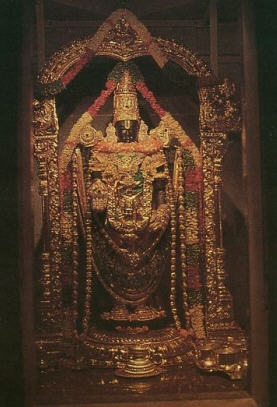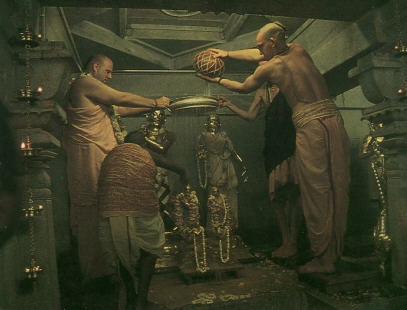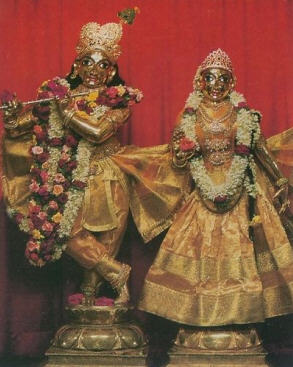ISKCON's new temple in South India blends modern and traditional architecture, hinting at ISKCON's aim of teaching eternal Vedic truths in the modern age.
On May 31 this year, the Hare Krsna movement opened a magnificent new temple in the South Indian city of Bangalore. The guest speaker for the opening ceremonies was Dr. Shanker Dayal Sharma, then President of India. Here is an interview with Madhu Pandita Dasa, president and project director for ISKCON Bangalore.
BTG: What inspired the Bangalore project?
Madhu Pandita Dasa: We wanted to build a center from which to teach Vedic knowledge in a practical and rational way for the benefit of as many people as possible.

The Krsna consciousness movement has wonderful things to offer everyone. Srila Prabhupada, ISKCON's founder-acarya, has taught how Lord Krsna's instructions can be applied to any situation in life. If we follow Krsna's instructions, we'll find the best within ourselves and achieve happiness. The new temple is meant to promote understanding of those instructions.
To help society attain happiness, today's world promotes knowledge in various fields. But all that knowledge pertains to the temporary material sphere only. It cannot provide the real, eternal happiness we are seeking. No amount of material progress will provide eternal happiness.
Because we are primarily spiritual, we must pay attention to developing our spiritual identity. The Krsna consciousness movement and, in particular, this temple is performing the service of developing the spiritual aspect of the society.
BTG: What makes this temple different from other temples?
MPD: This temple and all ISKCON temples provides much more for the soul than rituals. Spirituality today has come to the level of blind rituals and sentiment, and most temples aren't doing much to go beyond that. But ISKCON temples are centers of spiritual learning through godly association, centers where a visitor can learn the science of spiritual life.
BTG: India is full of people struggling for the basic necessities. How will the people of India benefit from this complex?
MPD: Socially, greed in one section of society causes poverty in another. The mood of exploitation forces human beings to forget one another's spiritual equality before God. But through spiritual knowledge we can find our common father, the Supreme Lord, and realize our brotherhood. Only in this way can there be peace, harmony, and social equality in our nation and among all nations. And that spiritual knowledge is what the temple is meant to teach.
Whether materially rich or poor, man is essentially spiritual. Wealth and poverty come by our past acts. Bound by the laws of karma, today's rich man may be a pauper in his next life. And the poverty or wealth of a society comes from the collective karma of its individuals.
As long as we are ignorant of the purpose of human life and serve only the body, we will stay bound by the laws of karma, which toss us about like the waves of the ocean. Rich or poor, everyone needs the knowledge that can prevent that bondage. So our temple is open to everyone, irrespective of class, caste, sex, nationality, or even religion.
The temple is needed to balance the material and spiritual needs of man. India's real asset is spiritual knowledge, but today many Indians have forgotten that. What remains of Vedic knowledge in society is hardly more than some cultural residue. Many Indians do not know the progressive values of human life, the basis of Vedic culture. People have not learned Vedic knowledge in a rational way.
But Srila Prabhupada taught Vedic philosophy rationally through his writings, which anyone can easily understand. The neglect of India's spiritual heritage is driving Indian society to chaos and confusion. The Krsna consciousness movement strives to teach the importance of that heritage.
So that is our task: spiritual education. And this temple project is an important instrument to fulfill it.
BTG: Don't most people in India already have some knowledge of Bhagavad-gita and spiritual life?

MPD: Culturally, Indians are better situated to understand this knowledge, if willing. To be born in Bharatavarsa [India] is considered most auspicious. It provides the greatest opportunity for spiritual advancement.
But in today's spiritually degraded world even Indians have opted to neglect their spiritual culture and follow the materialistic Western civilization. Instead of giving spiritual inspiration to the world, Indians have given up the responsibility to learn, practice, and promote the transcendental message of the Vedic scriptures.
Unfortunately even the leaders of the country know little of India's unlimited spiritual heritage and make no attempt to follow or promote it. When Srila Prabhupada was asked why it was easier to spread Vedic culture in the West than in India, he said that to wake someone who is sleeping is easy, but not someone pretending to be asleep. Westerners accepted their ignorance about spiritual matters and were eager students. Generally an Indian prefers to appear familiar with the Bhagavad-gita and other Vedic scriptures, although he knows them only by name and is disinclined to study them.
ISKCON is trying to inspire Indians to see their spiritual aspect as an important part of life and eventually become the guiding force of the world. We hope that eventually a new generation will become knowledgeable leaders and will rejuvenate and inculcate these values in the Indian society and all over the world.
If we who are born in India learn to appreciate and practice the values of Vedic science and culture, the whole world will follow. Srila Prabhupada taught the Vedic knowledge to people all around the world; he is truly India's cultural ambassador to the world.
Indians should take up the spiritual leadership of the world. We are not interested in cheap religious conversion. We are interested in making the world spiritually aware.
BTG: Turning to the architectural side of the project, as an architect and the project director could you tell us how the design emerged?
MPD: For the first two years after we got the land, we could not find a professional architect who understood what we really needed. That forced us to venture into it ourselves. Gradually over the past six years, through study, trial, and higher inspiration we developed the design. We never conceived it right at the start in its details as it stands today. It evolved by the grace of the Lord.
I am fully convinced that Lord Krsna, in the heart of all those involved in the project, was the guiding force in developing the design. Truly He is the architect.
I experienced this more directly when wonderful design solutions arose at various critical turning points. In the beginning, once we had decided to deal with the design ourselves, there was a time when concepts were rather unclear. Then Jagat Candra Dasa proposed the glass tower, and that set the design rolling in the direction of synthesizing traditional and modern elements. Gradually, I was able to develop the design, using aspects of traditional South Indian architecture. Srimati Bhaktilata, my good wife, helped with conceptualizing the overall aesthetics and the interiors. It was a great experience for me to develop the functional design of the complex. I hadn't imagined that my civil engineering education could be such an asset to me in my service to the Lord.
BTG: Apart from the five temple shrines themselves, what are some of the features the temple building includes?
MPD: The complex also houses shops, offices, a library, a lecture hall, a 350-seat multimedia theater, a 1,000-seat multi-purpose hall with equal dining capacity, ten smaller computer-aided theaters, a prasadamhall for pilgrims, and a lobby where visitors can learn from devotees about Krsna and Sanatana-dharma.

There are also eight seminar rooms for about forty people each. We plan to hold special seminars for groups such as executives, politicians, the elderly, school children, and congregation members from outside Bangalore.
A 70-room guesthouse under construction which will be available for visitors and life members.
A separate building will house 150 brahmacaris, celibate young men.
BTG: Did you received foreign funds to build the temple?
MPD: No. The people of Karnataka, especially from Bangalore, paid for the temple. We did not receive foreign funds. Srila Prabhupada organized ISKCON in such a way that each center is financially autonomous. We have enrolled people as members of our Life Patronship program. Today we have 22,000 life patrons registered in ISKCON Bangalore. Apart from that, many people sponsored specific items in the building.
ISKCON Bangalore houses about sixty serious full-time life-dedicated devotees. Many of these devotees are highly educated and have joined the movement inspired by the lofty instructions of the Vedic scriptures. They feel a sense of mission to do something constructive and spiritually uplifting for society. By their efforts, thousands of people were inspired to contribute for this great cause.
BTG: How has taking part in the project benefited the donors and life members who contributed toward it?
MPD: All our donors and life members are very fortunate to have helped the project, because they have done direct service to the Lord's mission. The opportunity to engage in the service of the Supreme Lord is rare and valuable. Service rendered to the Lord is the highest pious activity. Even the smallest service becomes an eternal asset and can save one from unlimited misfortune.
The greatest welfare activity is to provide society with spiritual knowledge. Our donors and life patrons have contributed for this cause and can take pride in being involved in it. It will surely be a matter of great satisfaction for them to see the fruits of their charity being distributed to everyone, irrespective of caste, creed, or color.
By serving Srila Prabhupada they must have greatly pleased him. And when a pure devotee of the Lord is pleased, the soul is immensely benefited. We are grateful to all who helped in this endeavor to serve humanity.
BTG: How will you run such a big complex?
MPD: The sixty full-time devotees will run and maintain it. Also, many people who practice Krsna consciousness at home offer practical service to the temple after work and during holidays. Some even take one day leave a month for a full day of service in the temple. So I don't see any problem in serving the thousands of pilgrims who will be visiting every day.
